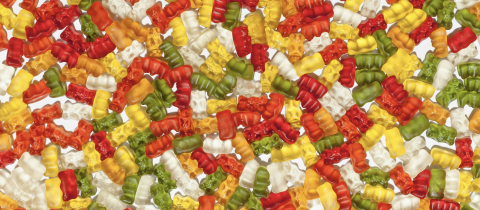Sugar is sweet and sticky. That’s a fact. In fact, during the reign of Edward the Confessor in the early eleventh century, "ale tasters" were employed to check on the work of brewers. They would test the ale by spilling some on a wooden seat and sitting on the spill in their leather breeches. If they had difficulty getting up after a short time because their breeches stuck to the seat, they knew that the ale had been sugared. Today we don't have to worry about such adulteration of our ale, and I think in any case we would have a hard time finding leather breeches. But the stickiness of sugar is still a problem for our teeth.
Bacteria that live in our mouths just love sugar. When they metabolize it they produce acids that eat away the enamel and cause cavities. But they also love starches which they can break down to glucose which also yields acids. So what is worse in terms of causing cavities, jelly beans or chips? The sugar in jelly beans is soluble and gets washed away by saliva but the complex carbohydrates in the chips are insoluble and stick between the teeth providing food for the acid-producing bacteria. Similarly, sugary soft drinks don't spend a lot of contact time with teeth, but constantly sucking on candies will lead to cavities. That’s another fact.
Now for a myth. Perhaps the biggest one surrounding sugar is that it affects behaviour, especially in children. How often have you heard a parent say that their children were bouncing off the walls after a sugary snack? The connection was first suggested in 1922 but it was in the 1970s that the lay literature took up the cause with "functional reactive hypoglycemia." Desperately searching to find a reason for ill behaviour, parents and teachers began to see links between eating sugar and hyperactivity. But wait a minute. Could it not be that children eat more sugary foods during activities that are prone to adverse behaviour, such as birthday parties? And that sugar does not cause the problem?
Studies tell us that this is indeed the case. When researchers challenge children with sugar or a placebo, they find that not only does sugar not cause hyperactivity, it can have a calming effect! There actually is a scientific rationale for this. Sugar intake elevates levels of a chemical in the brain called serotonin which has a calming effect. Why do the results of controlled studies differ so much from the impression of parents? Expectancy. When parents who believe their children are hyperactive because of sugar have their children challenged in a fashion where half are told the kids are getting sugar and half are told that they are not, the parents who think their children are being given sugar tend to evaluate the kids' behaviour as worse. There are plenty of reasons to avoid excess sugar, but the potential for bad behaviour is not one of them. And if you’re agitated by this discussion, have a sweet and calm down!







